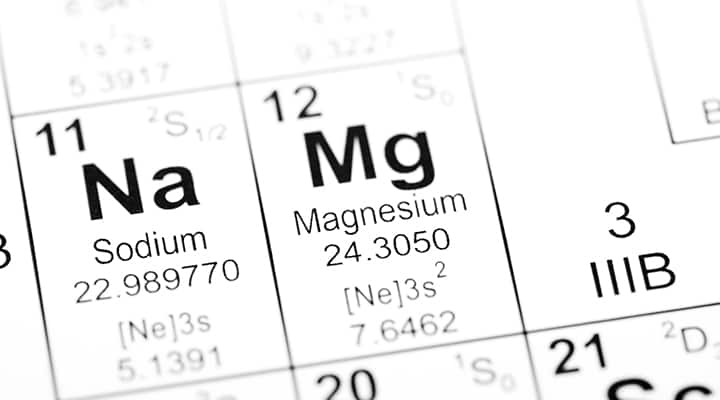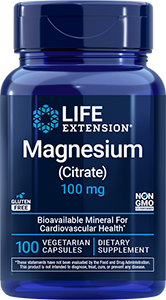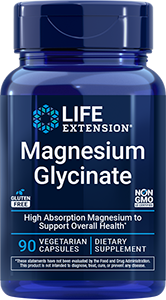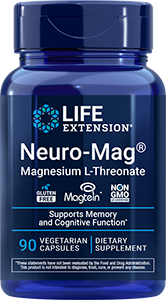
Magnesium Glycinate vs. Citrate: Which Type Is Best for You?
Published: November 2024 | Updated: August 2025
When it comes to dietary supplements, magnesium is likely on your radar. Magnesium supplements offer a number of benefits, including support for heart, brain, and bone health, as well as muscle and nerve function. Over 600 enzymes in your body need magnesium to perform critical functions. And yet, most of us don't get enough of this mineral through diet alone. This is where supplements come in.
There are various types of magnesium supplements, delivering different levels of elemental magnesium. Certain types of magnesium might be better tolerated and better absorbed than others.
So how do you know which magnesium supplement to take? In this article, we'll be focusing primarily on two of the most popular types: magnesium glycinate and magnesium citrate.
What is magnesium citrate?

Magnesium citrate is an organic form of magnesium combined with citric acid, also known as citrate.
- Benefits: Supplementing with magnesium citrate is one way to help boost your magnesium levels and support overall whole-body health, including support forcardiovascular function, immune health and maintaining strong bones.
- Advantages: One of magnesium citrate's biggest strengths is that it's easily absorbed because of its high solubility. It's also affordable.
- Composition: By mass, it provides 12-16% elemental magnesium. So in 1,000 mg, there is 120 mg to 160 mg of elemental magnesium.
- Tolerability: Magnesium citrate is an organic salt because it's complexed with citrate and not a mineral such as chloride or phosphate. Organic forms, such as magnesium citrate, contain a relatively lower concentration of magnesium and are generally considered to have better absorption and bioavailability based on published data and may be less likely to cause gastrointestinal side effects in some people at high doses compared with inorganic forms of magnesium.
What is magnesium glycinate?
Magnesium glycinate is an organic magnesium salt formed with the amino acid glycine, as opposed to citrate.
- Benefits: Like other forms, magnesium glycinate supports whole-body health—including bone, heart, muscle and nerve health.
- Advantages: It is well-absorbed because it is also an organic form that is soluble in water.
- Composition: By mass, magnesium glycinate contains approximately 10-14.1% elemental magnesium. This means that in 1,000 mg, there is between 100-141 mg of elemental magnesium.
- Tolerability: Magnesium glycinate may be a good choice for people who feel occasional GI discomfort when taking other magnesium supplements. It's easy on the GI tract because it contains a lower concentration of elemental magnesium per dose, which means it's less likely to impact the stomach.
Magnesium citrate vs. glycinate: Which is best absorbed?
Generally, magnesium glycinate and magnesium citrate are both well-absorbed by the body—which is why many magnesium supplements commonly utilize these forms. In general, organic salts of magnesium—which will include citrate and glycinate—provide better absorption because they are more water-soluble than inorganic magnesium forms.
Is magnesium glycinate or citrate better?

When it comes to magnesium citrate vs. magnesium glycinate, the choice depends on individual preference and tolerance. Both forms are well-absorbed. Both support many aspects of whole-body health. Really, the biggest difference between the forms is the compound the magnesium is bound to (glycine or citrate) and the percentage of elemental magnesium, which can affect the number of capsules or capsule size of your supplement.
Magnesium glycinate is a popular supplement form, but magnesium citrate is also a common choice and is slightly more affordable. If you notice occasional discomfort from taking one form or another, your choice may come down to which one makes you feel better after taking it.
The good news is, both magnesium citrate and magnesium glycinate can help maintain healthy magnesium levels and give your body what it needs for a healthy heart, efficient immune system, and strong teeth and bones. Magnesium helps your nerves and muscle cells communicate, promoting nervous system and muscle function. It also helps maintain already-healthy blood pressure levels and supports endothelial function and cardiovascular health.
Here's how the two compare:
Feature |
Magnesium Citrate |
Magnesium Glycinate |
|---|---|---|
Absorption |
Well-absorbed | Well-absorbed |
Compound bound to |
Citric acid (citrate) | Glycine (an amino acid) |
Elemental magnesium % (by mass) |
12-16% | 10-14.1% |
Affordability |
Slightly more affordable | A bit more expensive |
Tolerance |
Well tolerated | Well tolerated |
Benefits |
Whole-body health | Whole-body health |
Can I use a different type of magnesium?
Yes, you can! The body absorbs all forms of magnesium pretty well. So what's the difference? Organic forms, such as magnesium citrate and magnesium glycinate, offer a lower concentration of magnesium in a single dose.
On the other hand, inorganic forms like magnesium oxide offer a higher concentration of elemental magnesium in a single dose. Magnesium oxide is typically used in multi-ingredient products to deliver a high concentration of elemental magnesium without increasing the number of capsules needed.
If you want to increase your magnesium levels with a formula that offers more brain-boosting benefits, something like magnesium L-threonate is going to be a better option. This form of magnesium has been studied to support quick thinking and working memory, and it promotes overall cognitive health.
What are other forms of magnesium?

Aside from magnesium citrate and glycinate, magnesium is available in different forms that have their own specific percentages of elemental magnesium, as well as varying levels of bioavailability/absorption. Here are some of your options:
-
Magnesium oxide: Magnesium oxide (MgO) is the magnesium salt of oxygen. It is less soluble than magnesium citrate but contains a higher percentage of elemental magnesium per single dose.
-
Magnesium chloride:
Magnesium chloride (MgCl2) is an inorganic form of magnesium, like magnesium oxide. -
Magnesium threonate:
What's innovative about the L-threonate form of magnesium is its support for memory and cognitive function. -
Magnesium acetyl taurate:
This magnesium is combined with an acetylated form of the amino acid taurine. Magnesium acetyl taurate makes it easy for your brain to use, and it encourages a healthy response to stress and feelings of calm and relaxation. -
Magnesium malate:
Magnesium malate contains malic acid, which is naturally found in things like fruit and wine. -
Magnesium sulfate:
This is magnesium combined with sulfate (MgSO4). It's also referred to as Epsom salt. Some people will dissolve it in bathwater to help soothe their muscles, although the evidence for this is lacking.
How do I know if I need a magnesium supplement?
If you're unsure if you need a magnesium supplement, speak with your medical professional. You can take a magnesium lab blood test to check your current blood serum levels.
What should I look for when buying magnesium?
When looking for any supplements, keep these guidelines in mind:
Quality brand:
Choose a reputable company that offers high-quality products made with responsibly sourced ingredients.
Transparent labels:
The nutrition labeling should be thorough and transparent, with no hidden ingredients.
Third-party testing:
Independent testing helps to ensure the products you consume match their labels. Look for companies with third-party testing and those that provide a Certificate of Analysis (COA) on request for their products.
Health goals:
Any supplement you take should cater to your specific needs. It's always a smart idea to speak with your medical professional before starting any new supplement to ensure it fits your health concerns and your lifestyle.
Choose a form you like:
Taking your supplement every day matters more than whether you take magnesium glycinate, magnesium citrate, magnesium threonate, or any other form. Once you decide on your capsule, powder or gummy supplement, follow the directions on the label consistently.Magnesium plays a large role in keeping your heart healthy, but other nutrients can also help. Take our health needs quiz for a personal recommendation on the nutrients that fit your lifestyle.
References
- Ates, Mehmet et al. "Dose-Dependent Absorption Profile of Different Magnesium Compounds." Biol Trace Elem Res. December 2019. https://pubmed.ncbi.nlm.nih.gov/30761462/
- Blancquaert, Laura et al. "Predicting and Testing Bioavailability of Magnesium Supplements." Nutrients. July 2019. https://www.ncbi.nlm.nih.gov/labs/pmc/articles/PMC6683096/
- Felice, Valeria D. et al. "Bioaccessibility and Bioavailability of a Marine-Derived Multimineral, Aquamin-Magnesium." Nutrients. July 2018. https://www.ncbi.nlm.nih.gov/labs/pmc/articles/PMC6073474/
- Guerrera, Mary P., MD et al. "Therapeutic Uses of Magnesium." American Family Physician. July 2019. https://www.aafp.org/afp/2009/0715/p157.html
- Uysal, Nazan et al. "Timeline (Bioavailability) of Magnesium Compounds in Hours: Which Magnesium Compound Works Best?" Biol Trace Elem Res. January 2019. https://pubmed.ncbi.nlm.nih.gov/29679349/
- Yablon, Lisa A. et al. "Magnesium in Headache." Magnesium in the Central Nervous System. 2011. https://www.ncbi.nlm.nih.gov/books/NBK507271/
- "Magnesium." National Institutes of Health. June 2022. https://ods.od.nih.gov/factsheets/Magnesium-HealthProfessional/
- Reno AM, et al. "Effects of Magnesium Supplementation on Muscle Soreness and Performance." J Strength Cond Res. August 2022. https://pubmed.ncbi.nlm.nih.gov/33009349/
Always be in the know!
Access the latest deals, wellness news, expert health tips & more!







